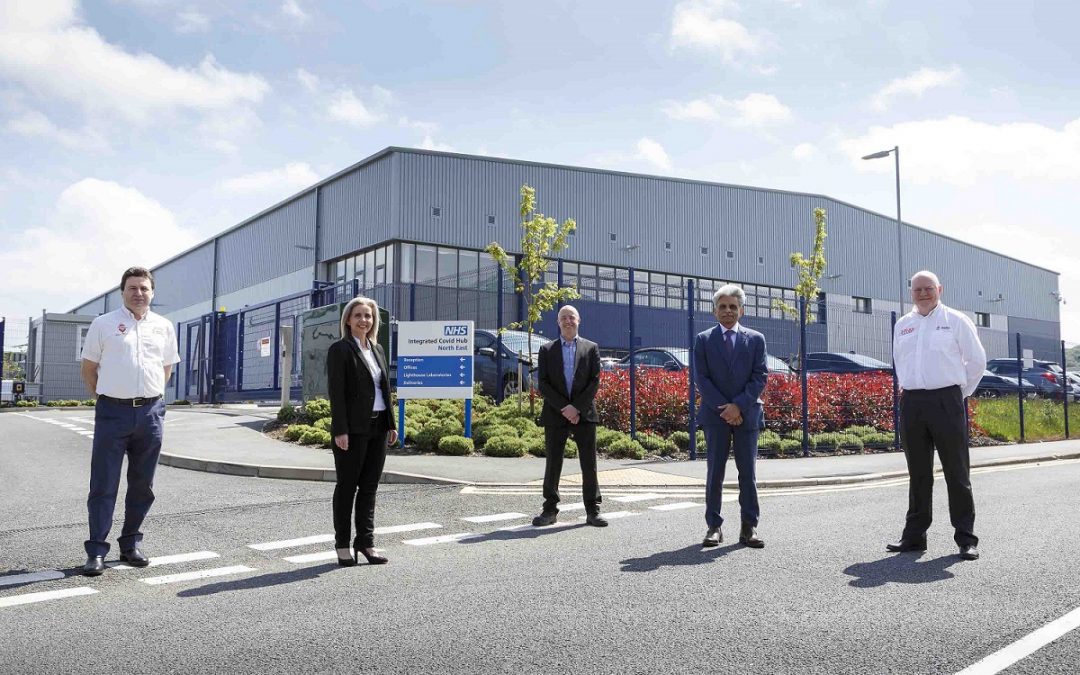A team of advanced manufacturing experts at the University of Sunderland have been instrumental in helping the region’s new Covid-19 Lighthouse laboratory produce thousands of tests a day.
The purpose-built facility at Baltic Park, Gateshead, opened in March and has capacity to process up to 40,000 tests a day, with swabs coming in from the region and beyond.
Managed by The Newcastle Hospitals NHS Foundation Trust, the facility has now carried out almost a million tests – a large scale laboratory process that was made possible with the knowledge and expertise at the University’s Institute for Automotive and Manufacturing Advanced Practice (AMAP).
The Trust brought AMAP on board as external consultants to effectively boost their testing capacity from “zero to volume”, drawing on the University department’s long-standing reputation in helping companies scale-up production, best practice, alongside digital and technological expertise.
Working in a laboratory the size of a football pitch and housing up to 700 staff, the AMAP team first created a large-scale digital simulation of the Lighthouse lab, ensuring the flow and layout were capable of reaching the testing volumes needed, and stress-testing the whole process as the physical building work was in progress.
The simulation gave NHS lab managers a full visualisation of the whole operation in advance of installation.
The team also advised on the logistics of Covid samples once they arrived on site, how they were moved and controlled throughout the laboratory up to the point of testing.
The team included Rita Potts (Operations, Process Improvement and Simulation Specialist), Adrian Morris (Senior Manufacturing Specialist) and Roger O’Brien, Director of AMAP, who said: “We were honoured to work on this world-class project in partnership with The Newcastle Hospitals NHS Foundation Trust, to increase testing capacity in the fight against this virus at an exceptional time.
“We brought all of our knowledge and expertise to this complex project, working alongside the NHS scientists to develop the lab functionality and performance around the science, helping the Trust to scale up planning and the process to get to volume testing.”
Roger added: “Our team has also been able to offer the NHS an insight into new ways of working in a lab of this scale, and in return AMAP and the wider University benefits from the knowledge and expertise acquired from such a significant project.”
Chris Shaw, director of operations at the Baltic Park Lighthouse Lab, said: “Setting up a full laboratory this size, in the timescales given, was a huge task.
“From an operational and clinical perspective, we had a clear vision of what was required, but we needed the expertise of the University team to make sure we could deliver quick turnaround of the expected volume.
“Rita and her team made sure we were able to design and put in place effective, streamlined and consistent processes.
“Our partnership with the University of Sunderland has been critical in establishing one of the largest Covid testing labs in England.”
This is not the first time AMAP has used its expertise to help in the fight against Covid-19.
Last year during the first lockdown, the team designed and manufactured door openers in less than a day with the help of a 3D printer.
The device attaches to door handles, and allows you to open the door without the handle touching your hand.
The forearm is used instead. They also designed protective face shields, used by frontline healthcare workers in North East hospitals during the first wave.
Continuing their innovation and developing problem-solving solutions on the Lighthouse lab project, they also designed and manufactured equipment, using CAD, 3d printing and laser cutting at the University which would improve the testing processes, including a test tube sizing laboratory tray and rail stands to hold samples ready for the testing itself in position.
The Lighthouse laboratory is part of the integrated Covid hub for the north east, which places the region at the forefront of managing the virus, through:
providing state-of-the-art testing capacity, via the new Lighthouse lab
strengthening coordination between local authorities and the health service, including sharing more data, insight and resources to manage outbreaks
accelerating new methods of Covid-19 testing – led by a new innovation lab connecting NHS, industry and universities.
The Trust’s chief executive, Dame Jackie Daniel, said: “The Department of Health and Social Care’s investment in this new Lighthouse laboratory provides a valuable resource for our region, supporting in the fight against this pandemic and strengthening our resilience even further.
“The facility was built by partners pulling together and puts us in a stronger position to manage and control the virus.
“It is testimony to the collaborative approach we have taken to tackling Covid-19.
“All involved have worked very hard and my deepest thanks go to everyone who has played a part.”
